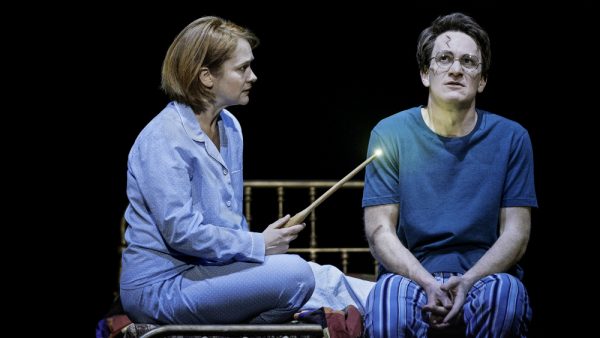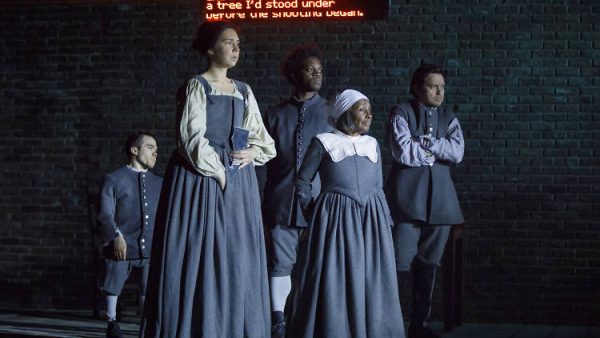The 2017-18 Broadway season ended with the usual rush of productions racing to qualify for the Tony Awards. There was no unifying theme amid the final plethora of shows, but two of them did share a common element—their producers banking on American theatergoers’ love affair with all things British. Two imports featured feats of English legerdemain—a theatrical sequel to JK Rowling’s beloved series of book on the boy wizard Harry Potter, and Travesties, a revival of one of Tom Stoppard’s early works of intellectual sleight of hand.

Credit: Manuel Harlan
Harry Potter and the Cursed Child flew into the Lyric Theater after an Olivier Award-winning run in London. This two-part continuation of Rowling’s enchanting saga is a strong favorite to repeat that triumph at the Tonys. The intricate script by Jack Thorne (based on an original new story by Rowling, Thorne, and director John Tiffany) begins 19 years after the events of the last book with Harry all grown up and his son Albus—named for his mystical mentor at Hogwarts school—encountering myriad magical trials and tribulations as the boy attempts to establish his own wizard identity outside of his dad’s legendary shadow.
A knowledge of Potter lore is helpful to enjoy the spectacle since Thorne alludes to almost every aspect of the entire seven-volume canon. Devoted followers will be in seventh—or eight and ninth—heaven. (At the performance attended, the audience was filled with fans dressed in witchy regalia and a dad accompanying his two kids behind me loudly whooped for every reference and magic trick.) For non-Harryheads, Cursed Child is still a joyous thrill ride, staged with such speed, ingenuity and affection by Tiffany that the seven-hour running time bullets along like the phantom train to Hogwarts. By the way, that train is prominently featured, cleverly recreated thanks to Christine Jones’ jigsaw-puzzle set and Neil Austin’s multi-dimensional lighting.
A large British and American cast bring the faculty, students and alumnae of Harry’s alma mater to life, but special kudos are due to Anthony Boyle as the bumbling Scorpius Malfoy, son of Harry’s nemesis and Albus’ best friend. Boyle gives several new twists to the traditional awkward but lovable teen staple character, with multiple shadings and inventive delivery to Scorpius’ ardent quest to befriend Albus and escape his father’s dark legacy. Boyle is just one of many delights in a galaxy of theatrical wonders.

Credit: Joan Marcus
Patrick Marber’s dazzling revival of Tom Stoppard’s Tony-winning Travesties (1974) is another imported dish worth savoring. First presented by the Chocolate Menier Factory and produced here by the Roundabout Theater Company, this vital comedy of ideas raises complex questions about the confluence of art, revolution, and war. Just as Harry Potter requires some prior knowledge of the hero’s history, this rollicking intellectual roller-coaster assumes you know a thing or two about European literary history and politics. Stoppard takes his complex premise from the coincidence that three revolutionaries—Irish novelist James Joyce, Russian rebel Lenin, and Tristan Tzara, leader of the radical Dadaist art movement—were all in Zurich, Switzerland at roughly the same time (1917). Henry Carr, a minor clerk with the British consulate during this period, in a senile flashback mashes together these separate storylines and filters them through the plot of The Importance of Being Earnest (Carr performed in an amateur version of Wilde’s classic comedy staged by Joyce.)
Tom Hollander repeats his scintillating and versatile London performance as Carr, effortlessly switching for the decrepit elderly narrator to the young, pompous and pretentious protagonist tangling with the mental heavyweights of his age while romantically pursuing the librarian Cicely (a delightful Sara Topham). As Tzara, Seth Numrich energetically bounds across Tim Hatley’s handsome book-stuffed set, spouting absurdist nonsense as he embarks on a parallel amorous quest parallel for Gwendolyn (an equally delightful Scarlett Strallen). If this all sounds confusing, it is a bit, but Marber’s precise and whip-smart direction is so fast and funny, you’ll joyfully laugh along for the whole ride.

Credit: Joan Marcus
While Stoppard’s wit is well served in this revival, his contemporary and fellow British risk-taking playwright Caryl Churchill’s innovative and brash style is not given adequate realization in a new production of her Light Shining in Buckinghamshire, at the off-Broadway New York Theatre Workshop. Written during the same era as Travesties (1976), Light also mixes historical and fictional figures in an examination of the 17th century British Civil War which split the very fabric of English society. A king was beheaded and the ensuing chaos pitted faction against faction. Religion, government, family life—all were affected.
Churchill developed her script in collaboration with the Joint Stock Theater Company, combining historical texts with improvisations and short scenes depicting farmers, soldiers, politicians, parsons, lords, butchers, and housewives living through tumultuous times. The play is a fragmentary portrait with few solid through-lines to follow. In her later works such as Cloud 9, Top Girls, and Serious Money, Churchill perfected the technique of attacking a big topic through the fractured lens of multiple perspectives. Here it’s just confusing. Obie winning director Rachel Chavkin has employed her bold imagination to produce startlingly fresh stagings of such shows as Natasha, Pierre and the Great Comet of 1812, The Royale, and Hadestown (also at NYTW). But she settles for a flat, stagnant staging. Despite the valiant efforts of a diverse cast of six, this Light is too dim.
Harry Potter and the Cursed Child, Parts One and Two: Opened April 22 for an open run. Lyric Theater, 213 W. 42nd St., NYC. Wed Part One 2pm Part Two 7:30pm, Thu Part One 7:30pm, Fri Part Two 7:30pm, Sat–Sun Part One 2pm Part Two 7:30pm. Running time: Part One: two hours and 40 mins. including intermission, Part Two: two hours and 30 mins. including intermission. $20—$199 per part. (212) 556-4750. www.ticketmaster,com.
Travesties: April 24–June 12. Roundabout Theatre Company at the American Airlines Theatre, 227 W. 42nd St., NYC. Tue 8pm, Wed 2pm & 8pm, Thu–Fri 8pm, Sat 2pm & 8pm, Sun 3pm. Running time: two hours and 20 mins. including intermission. $59–$252. (212) 375-3939. www.roundabouttheatre.org.
Light Shining in Buckinghamshire: May 7–June 3. New York Theatre Workshop, 79 E. 4th St., NYC. Tue–Wed 7pm, Thu–Fri 8pm, Sat 2pm & 8pm, Sun 1pm & 7pm. Running time: two hours and 40 mins. including intermission. $69. (212) 460-5475. www.nytw.org.
[alert type=alert-white ]Please consider making a tax-deductible donation now so we can keep publishing strong creative voices.[/alert]
